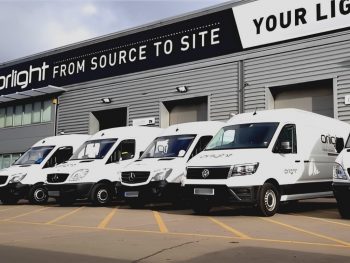Lighting manufacturer Orlight has achieved major cost, environment and safety improvements after joining the FORS scheme.

The Hertfordshire-based business joined the scheme in 2014 and has been a Gold Operator for the last five years. During its time as a member, it’s seen up to 25% savings in operational costs as a result of upgraded policies and processes for its six-strong vehicle fleet.
It’s also achieved savings of up to 8.9% in CO2 emissions and 9.2% in NOx emissions thanks to better driving behaviour – while also reaching the landmark of a six-year zero-incident record due to comprehensive training through FORS.
Transport manager Claudiu Popa said the company’s operational savings were directly linked to its FORS membership and the resultant access to training that it’s received.
“The performance management toolkit really helped us set our targets and gave us the key to creating sustainable business solutions. Taking advantage of the FORS eLearning modules provided tools to create better policies and procedures as well as significantly improve our MPG, thereby also reducing our carbon footprint.”
Popa, who is also the company’s elected Fuel and Emissions and Road Risk Champion, recognises how crucial FORS driver training has been to improving fuel usage and has recorded savings of up to 17.5% since becoming FORS-accredited.
Orlight drivers are provided with regular access to FORS eLearning and in-class training courses and, to date, all drivers have completed both Safe Urban Driving (SUD) and LoCITY Driving training.
This focus on road risk management and road user safety has been instrumental in the company recording zero safety-related incidents for the last six years.
Despite being Gold-accredited for the last five years, the company remains focused on continuous improvement. It signed up new routing software and telematics partners in 2022, aimed at improving the fleet’s route efficiency, providing access to more detailed reports on idling, MPG and driver behaviour and subsequently having a positive impact on lowering emissions.
The future focus is on upgrading the fleet to alternative-powered vehicles with a target of improving emissions, range, noise pollution and payload. The company is considering all options to achieve its emission-reduction goals.

